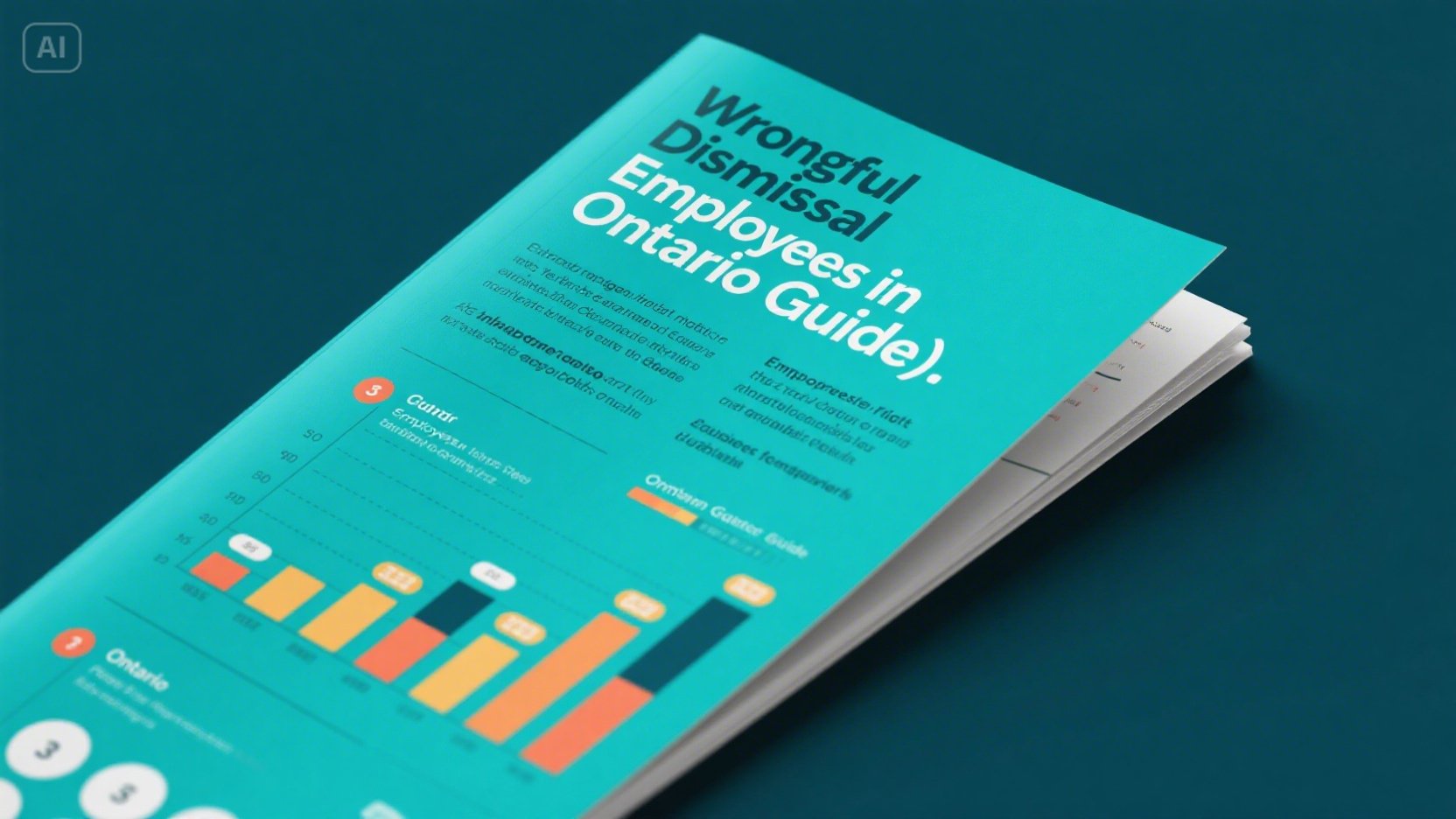Losing your job unexpectedly can be both emotionally distressing and financially destabilizing — especially when you believe the termination was unfair. In Ontario, employees have legal protections to guard against improper job loss. One of the most important concepts to understand is wrongful dismissal, which refers to being terminated without reasonable notice or adequate compensation, in breach of your employment contract or statutory rights.
This blog post outlines what wrongful dismissal is, how to recognize if it’s happened to you, and what legal options are available if you’ve been affected.
What Is Wrongful Dismissal?
Wrongful dismissal occurs when an employer terminates an employee without providing the appropriate amount of notice or pay in lieu of notice, as required by the Employment Standards Act (ESA) or a written employment contract.
Crucially, wrongful dismissal doesn’t necessarily mean the employer had no reason to fire you. Rather, it means the employer didn’t follow the proper process or provide what the law requires when ending your employment.
An employer generally has the right to end an employment relationship — but they must do it fairly, lawfully, and in accordance with the employee’s legal entitlements.

Examples of Wrongful Dismissal
While not every firing qualifies as wrongful, the following scenarios may indicate a breach of employment rights:
- Insufficient Notice or Pay: You’re let go without adequate working notice or compensation.
- Termination for Cause Without Grounds: The employer claims “just cause” based on vague or unsubstantiated allegations.
- Constructive Dismissal: Your job changes so significantly (e.g., major pay cut, demotion, hostile environment) that you feel forced to resign.
- Discriminatory Firing: You are terminated for reasons related to age, disability, gender, or other protected grounds.
- Retaliation: You are dismissed after filing a workplace complaint or asserting your legal rights.
Each of these situations can involve complex legal evaluations to determine if the dismissal was indeed wrongful under Ontario law.
Your Rights Under Ontario Law
Ontario’s Employment Standards Act outlines the minimum entitlements for notice or pay in lieu of notice based on the length of your service:
- 1 week for 3 months to 1 year of service
- 2 weeks for 1 to 3 years
- Up to 8 weeks for 8+ years
However, these are just minimum standards. In many cases, employees are entitled to significantly more under common law, which considers factors such as:
- Age
- Length of service
- Type of position
- Availability of similar employment
For example, a 50-year-old employee who worked 15 years in a senior role could be entitled to 12-18 months of severance, even if the ESA only requires 8 weeks.
Read More: Patent Lawyer Salary Breakdown: How Much Do They Make Based on Experience, Location, and Industry?
What to Do If You’ve Been Wrongfully Dismissed
If you suspect that your termination was improper, taking the right steps early can make all the difference:
Don’t Sign Anything Right Away
Employers may offer severance packages that require you to sign a release. These offers often fall short of your legal entitlements. Always review the documents with a legal professional before signing.
Gather Documentation
Keep copies of your employment contract, termination letter, pay stubs, performance reviews, and any written communication related to your dismissal. These documents can be crucial for supporting your claim.
Assess the Reason Given for Termination
If the reason is vague or seems unfounded, this may be an attempt to avoid severance obligations by claiming “just cause.” This tactic often doesn’t hold up in court.
Consult an Employment Lawyer
Employment law is highly nuanced. A lawyer can review your circumstances, advise on your rights, and negotiate on your behalf for fair compensation.
Constructive Dismissal: A Special Case
Constructive dismissal occurs when an employer doesn’t fire you outright but makes your working conditions so unbearable or changes your role so dramatically that you’re effectively forced to quit. Common examples include:
- Sudden demotion without cause
- Significant salary reduction
- Unsafe or toxic workplace conditions
- Drastic changes to job duties or work location
If you leave your job under such conditions, the law may still consider it a dismissal — meaning you could be entitled to severance or compensation.

Just Cause Dismissals: When Are They Valid?
Employers sometimes argue they don’t owe severance because they had “just cause” to fire you. This legal standard is very high and requires proof of serious misconduct, such as:
- Theft or fraud
- Repeated insubordination
- Harassment or violence in the workplace
- Gross negligence
Poor performance or a single mistake usually isn’t enough to establish just cause. Employers who mislabel a termination as “just cause” can still be liable for damages.
Why Legal Advice Matters
Even when you’re confident your dismissal was wrongful, navigating the legal system alone can be overwhelming. Employment lawyers understand the complex interplay between contract law, statutory rights, and court precedents. They can help you:
- Evaluate whether your dismissal was legally valid
- Determine what notice period or compensation you’re entitled to
- Draft a legal claim or negotiate a settlement
- Represent you in negotiations or court proceedings
Many legal consultations are free or offered on a contingency basis, so getting help may be more accessible than you think.
Frequently Asked Questions
How long do I have to file a wrongful dismissal claim?
In Ontario, the limitation period is generally two years from the date of termination. However, acting quickly improves your chances of recovering evidence and negotiating a better settlement.
Can I get Employment Insurance after being dismissed?
Yes — unless you were dismissed for misconduct. Even then, the employment insurance decision often differs from legal assessments of just cause. If your claim is denied, you may appeal.
Do part-time or contract workers have the same rights?
In many cases, yes. Even independent contractors may be considered “employees” under the law if the working relationship reflects employer control, exclusivity, and economic dependence.
Conclusion
Wrongful dismissal isn’t just a breach of contract — it can disrupt your livelihood and shake your confidence. But knowledge is power. By understanding your rights and the signs of an unlawful termination, you can take decisive steps to protect yourself.
If you’ve recently lost your job and feel the circumstances were unfair, it’s worth exploring whether you were wrongfully dismissed. Armed with legal guidance, you can seek the compensation and closure you deserve.
Apart from that, if you are interested to know about “Understanding the Intricacies of Personal Injury Law” then visit our “Law” category.



